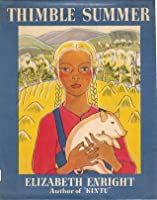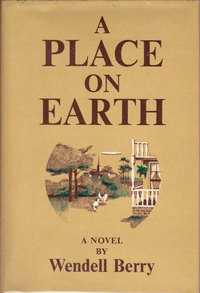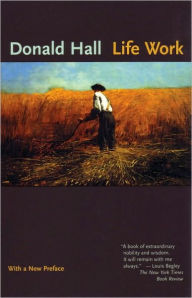With all the political turmoil here in the U.S. last week, I turned for comfort to this middle-grade novel by the author of the Melendy Quartet (The Saturdays, etc.) and one of my favorites from childhood: Gone-Away Lake.
First published in 1939 and winner of the Newbery Medal that year, Thimble Summer is the story of nine-year-old Garnet Linden who finds a silver thimble in a dried-up waterbed. She wonders if it might be magical, and indeed that night rain finally comes to her family’s drought-stricken farm, saving their crops.
Depression-era Wisconsin is beautifully captured in this story, as is life on a small family farm. Garnet adopts the runt in a litter of pigs to raise and by the end of the summer is ready to show him at the fair. The joy of a dip in the river after a day in the fields or threshing is captured with imagery appropriate for someone of Garnet’s age.
It’s not all swimming holes and ice cream cones. During an all-night vigil tending the lime kiln that must be continually stoked if they are to have the necessary lime to build their new barn, a mysterious figure appears in the woods. It turns out to be a boy not that much older than Garnet who, left parentless, has been hitchhiking around the country taking jobs as a farmworker when necessary. The Lindens ask him to stay on to help with building the barn, wanting the help but mostly wanting to feed the undernourished boy.
In another adventure, Garnet and her friend Citronella stay too long at the library and are locked in for the night. What starts out as a fun adventure gradually becomes something more, as Enright expertly channels the mind and heart of a young girl.
Last week someone who is writing a memoir questioned her right to do so when her life has no terrible tragedies. I have come across this fear in the memoir classes I teach, so I told her that every life, no matter how blessed, has setbacks and difficulties to overcome. Handled well, these create the necessary conflict to drive the story. Memoir doesn’t have to become what some have called the trauma olympics. What matters most is the quality of the writing.
As noted in Anita Silvey’s The Essential Guide to Children’s Books and Their Creators, in writing this book Enright called on memories of summers spent on Frank Lloyd Wright’s farm in Wisconsin, as well as family stories passed on by her mother and grandmother.
Knowing this adds an extra dimension to the story for me, but truly I was just grateful to be back in the world of my own childhood, happily curled up in a corner of our neighborhood library reading everything from fairy tales and King Arthur stories to books about the adventures of ordinary children like me.
What is a favorite childhood book of yours?



